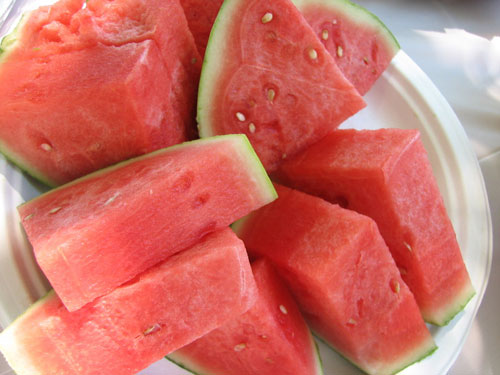'Gasoline' made from watermelon
Hundreds of thousands of tons of watermelons thrown away annually around the world could become a source of fuel for biofuel production.
Ethanol is an alcoholic fuel produced by fermentation and distillation of grains containing starch that can be converted into simple sugars (corn, wheat, barley). In addition, this alcohol is also produced from plants and grass containing cellulose. It is called bioethanol. Ethanol is an additive to increase the Octane value (the measure of detonation ability) and reduce the harmful emissions of gasoline.
According to the Telegraph , every year farmers and super-Americans in the US market remove about one-fifth of the watermelon (360,000 tons) in the field in each crop because they do not meet the standards (with a distorted or bruised shape on the shell). Farmers often turn them into green manure to fertilize the fields. Scientists from the US Department of Agriculture claim that the amount of thrown watermelon can generate nearly 9 million liters of ethanol biofuels.

Dr. Wayne Fish, a scientist from the US Department of Agriculture, confirmed that 50% of discarded watermelons can produce ethanol through fermentation.
' We all know watermelons contain sugar. Our tests show that sugar can be distilled into ethanol . Thus the watermelons that humans dispose of can become a great source of sugar for biofuel production. On average, the amount of unqualified watermelon per hectare in watermelon fields can produce about 90 liters of ethanol. Yet throughout the years they have been treated as garbage , "he said.
Western countries are encouraging the production of biofuels to replace fossil fuels. The European Union wants biofuels to account for 5.75% of the total fuel for transport in 2010. However, experts predict this goal is difficult to implement.
- 10 things to know when you know how to eat watermelon
- Who should not eat watermelon?
- Things to know about E5 gasoline
- Users do not need to worry about using E5 gasoline
- Seedless watermelon with apples
- Decoded the watermelon genome
- Removing A83 gasoline is beneficial to the environment
- Video: Experiment 'easy to make, delicious' with watermelon
- Be careful with the side effects of watermelon
- Australia: List of series of cars and motorcycles not suitable for E5 gasoline
- Create interesting shapes on watermelon with a spoon
- Modifying gasoline from sawdust
 Why do potatoes have eyes?
Why do potatoes have eyes? 'Tragedy' the world's largest carnivorous life: Death becomes ... public toilet
'Tragedy' the world's largest carnivorous life: Death becomes ... public toilet Tomatoes were once considered 'poisonous' for 200 years
Tomatoes were once considered 'poisonous' for 200 years Detecting microscopic parasites on human face
Detecting microscopic parasites on human face